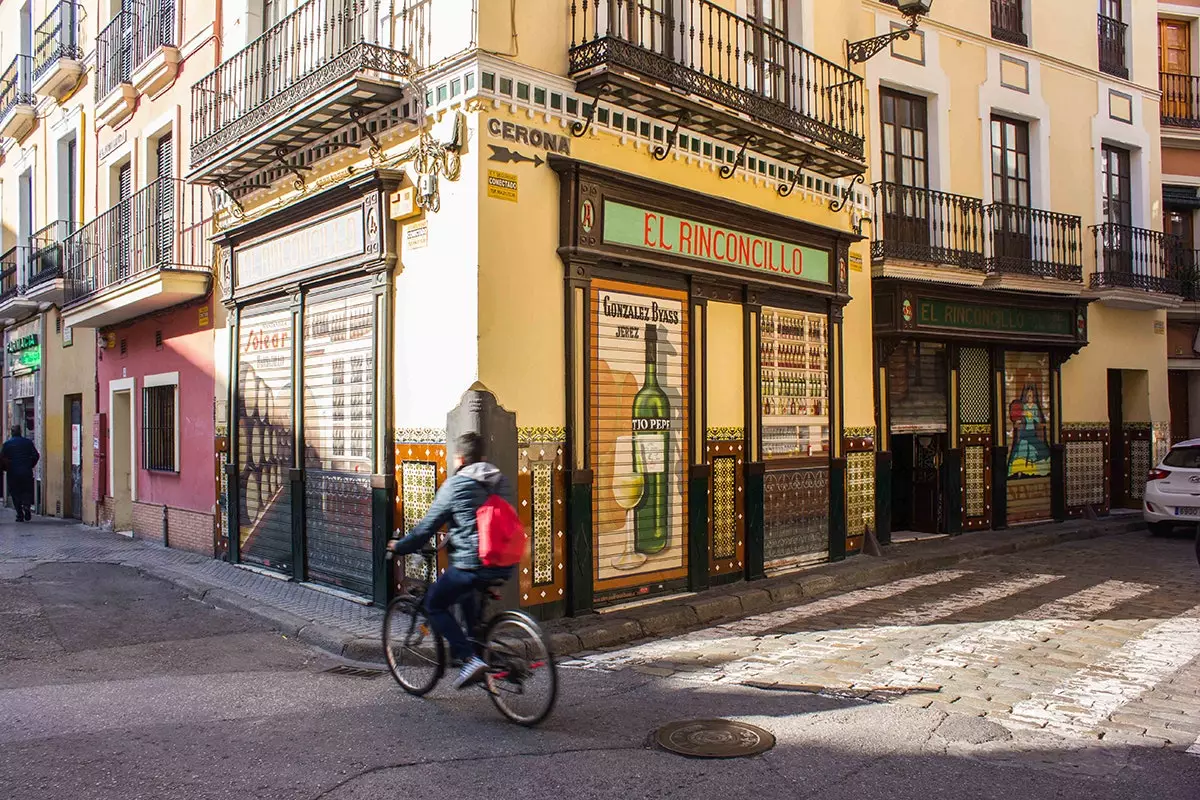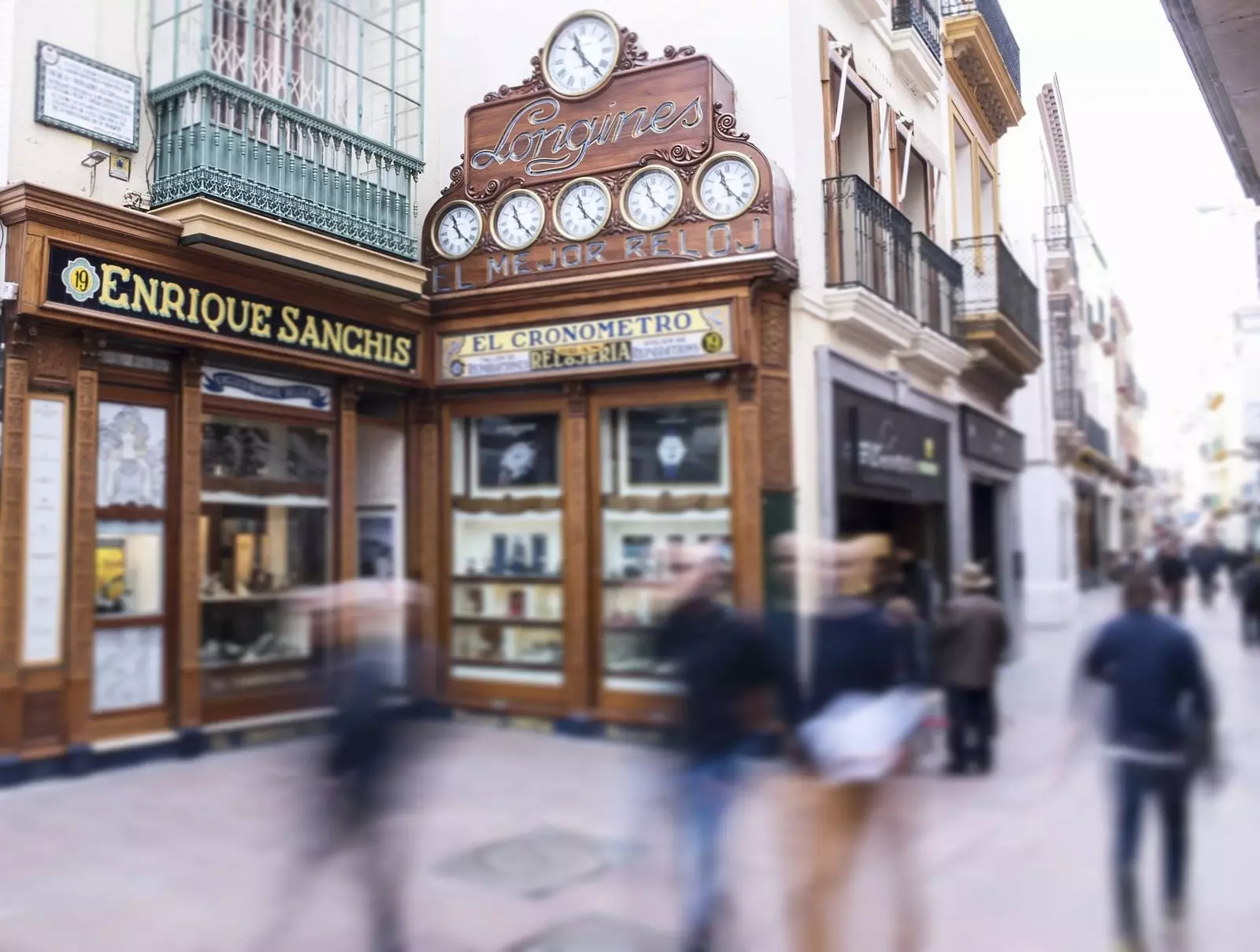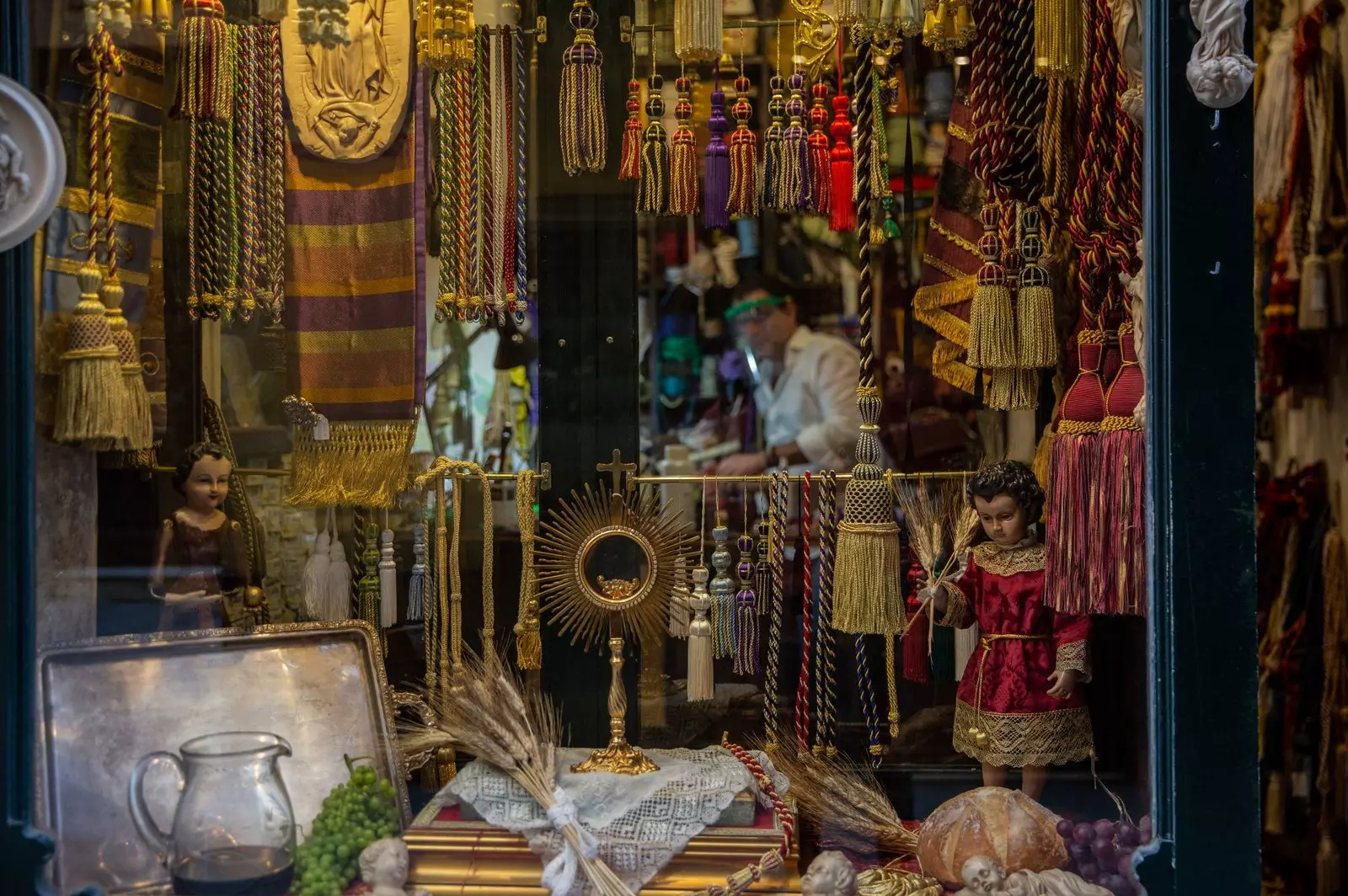It is only necessary to cross its doors to steeped in tradition and solera. The ones that transmit their walls, which seem to want talk and tell the thousand and one anecdotes occurred inside. Also your counters , Some intact despite the passage of time. Or the products they offer, in many cases isolated hard-to-find treasures in other places.
But, above all, that almost palpable authenticity is perceived from those who keep them alive: its shopkeepers, those who give it its reason for being.

The Corner.
We are talking about century-old businesses that populate the most authentic streets of Seville. Shops, bars, cafeterias... who have known to face the decades, the crises, the setbacks and to adversity, and who continue to defend their name with honor. Nonetheless… and hopefully forever.
EL RINCONCILLO, THE SHELTER OF THE FOUR “PÉS”
Journalists, police prostitutes and poets. They were, they say, the regular customers of this tavern founded around 1670 outside of which tourists now queue up —also locals, watch out— to be able to access and enjoy your sunshine. And go lonely.
It shows in that I don't know what that is breathed as soon as, leaning on his mahogany bar , we kindly ask the waiter to arrange a small cap of spinach with chickpeas —more typical, impossible—, and this almost by inertia writes down the account chalk on wood. What time please.
Rare is the day when you don't have to wait to get a spot, but the atmosphere that exists inside, with the walls full of old tiles and cupboards overflowing with exquisite products, it is well worth it. From the ceiling, hams waiting their turn to be served in thin slices.
A sign warns that “Singing is prohibited”, although today it is completely contradictory. At El Rinconcillo, a charismatic business where they exist, you are going to have a good time and enjoy a good time in Seville ways. And they take care of their customers so much that they never consider closing their doors: film shoots and commercials what have been done in it —beyond the garden either Blood and Sand, among others—have had to do it at night.
OLD SALVADOR CANDLE WORKS
Neither him end of old rental contract that they maintained for years, not even a pandemic has been able to put an end to this ancient business anchored in one of the most emblematic squares of Seville: El Salvador not only does it have a mythical church and a privileged location, it also has the most acclaimed bars and arcades among Sevillians for have a beer after work —there it is—.
However, between Manuel and Antonio, siblings and fourth generation of the same family in front of this mythical chandlery , continue to carry the name of the Old Cerería El Salvador to all those towns and cities where they order their products: over 400 sororities spread over all the spanish geography They ask for your good work.
founded in 1845, Entering its particular temple to Holy Week never ceases to amaze locals and strangers: images and religious objects hang from its walls of all kinds and in the air you breathe the scent of incense. And it will continue to do so, we have no doubt, for a long time to come.
NOT A MAN WITHOUT HIS HAT
And not a lady, would be missing more! That's how clear they have it in this business with More than 120 years of history —it was founded in 1896, being the first hat shop in Seville— in which the unique rounded boxes that contain the models of most authentic hats they are stacked by dozens in every corner: entering Sombrerería Maquedano is like crossing the imaginary line to a parallel universe.
There they wait to attend with the best of smiles and all the knowledge in the world two Cristinas: Menéndez and Vega, mother and daughter and part of that family that generation after generation has worked hard to maintain elegance and good looks over the heads of Sevillians… and beyond.
The place where they are since 1908, modernist style, It is located in the commercial heart of Seville, between Rioja and Sierpes streets, and retains those details from the past, such as the spiral staircase, which make it especially attractive.
But what really needs to be valued in this mythical business is the huge variety of models with which it has in its catalog: the simple thing is find the one that fits the measurements, the difficult part, opting for just one.
PARADISE OF THE GOURMETS
You don't have to walk too far from Maquedano to reach La Campana , that crossroads of streets with its own name in the epicenter of Seville Where is our next stop? A little corner where everyone, locals and foreigners, stop without being able to avoid it have the coffee on duty... accompanied by a cake.
And it is that La Campana Confectionery, which has been feeding the greedy soul of its customers since no less than 1885, continues without losing an iota of authenticity or quality.
His story, which seems to be taken from a novel, started from the hand of Antonio Hernandez Merino a pastry chef who made money in Philippines and that on his return to his city he found in this eighteenth-century building the ideal place to set up his business.
Despite the passage of time, its interior preserves that essence of the past embodied in modernist details such as moldings that decorate the ceiling the capitals of its columns. In the showcases, a display before which to fall surrendered without shame: it does not matter which of its sweets made by hand daily we decide, that they are all delicious —although their famous puff pastry They are always a safe bet.
HOLY WEEK BY FLAG
To speak of Seville is to speak, inevitably, of Holy Week. And one of the businesses that is most related to this famous festival throughout the city is the Antigua Casa Rodríguez: they have behind them no less than two centuries dedicated to craftsmanship of wigs and accessories to dress up Nazarenes and costaleros. In fact, it is said to be the second oldest business in Seville.
Manage your local primitive, in Alcaicería street, María del Río, niece of the founder's great-grandson and fifth generation at the helm, which she acknowledges is likely to be from the few Seville offices who can boast of having attended several generations of the same family.
In its shop window, as well as inside, a festival of accessories such as robes or hoods , in addition to brotherhood articles, goldsmith objects or incense. It is so striking that even the guides stop at the establishment to show it to tourists. It will not be necessary to wait for Easter to Feel it in all its splendor.
BETWEEN PAPERS, INKS AND PENS
Again you have to go back to the central Sierpes street —what will this street have, what will it have— to plant ourselves in front of the Ferrer Stationery, the earthly paradise for lovers of beautiful things. So much so that it will be difficult to get out of it empty-handed.
And although it is surprising that a business dedicated to such a specific matter can survive more than a century, and do it keeping the same personality, here is the proof that things done with a lot of love have their reward: This is the oldest stationery store in Spain, and the third in Europe.
behind the counter, the fifth generation of the Ferrer family, Estrella, her daughter and her nephew – let's be calm, the sixth generation is already assured—, They never tire of repeating the history of this emblematic corner, which is their own history: ran 1856 when a young couple formed by José Ferrer y Poch, and Josefa Vidal y Fragoso , arrived in Seville ready to embark on Cadiz to cross over to America.
Coincidences of life, they had to stay in the city longer than expected, and in the meantime, They created this little business. Who was going to tell them that more than 160 years later, their relatives were going to continue in the same place, among pens, pencils and notebooks, “helping to write”.

The Chronometer.
CAN YOU TELL ME THE TIME?
An easy answer to answer if it coincides that he walks next to the facade of the emblematic The Chronometer, name of this Seville watchmaking of 120 years. The reason? We found it next to what was his first store, in 21st street —guess what?— Serpents, where decorate the wall six clocks what with British punctuality , indicate the time. Although originally there was only one, with the preparation of the city for the Ibero-American Exhibition of 29, the rest was added.
Today El Cronómetro has three more stores spread throughout the center of Seville, however, this is the authentic, the mythical, the origin of everything: the one that opened in 1901 from the hand of the grandfather of the current owners, the Sanchís family, from Gandia.
Since then they have struggled to keep the physiognomy of the store as intact as possible , hence a visit to contemplate its infinity high end watches suppose a real time travel: And what better place than this to do it? Among his possessions, antique pieces of great value that very soon They will become part of a museum.

Alba lacing.
CRAFTS WITH HISTORY
Exactly: the one that continues to be made with centuries-old machines in the Alba cording , one of those businesses that has struggled to maintain a little piece of the past in the present . You just have to enter your local frank street to run into one of those peculiar devices that are living history and that allows them continue making your laces , outside the store, in the most traditional way: you just have to keep in mind that the art of lace has its origin in the fifteenth century to get an idea.
It was Francisco Alba Galan the promoter of a business of which few are left: some black and white photos they still keep him very present in the store. He was the father of the godfather of Jesus, who today runs the cordonería, and whom the business was transferred to him in 1904 for two thousand pesetas at that time. Even today it is possible to contemplate, from time to time, how they make the laces in the middle of the street. Like they did in the old days. As if the years had never passed.
